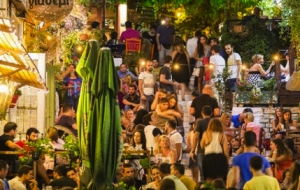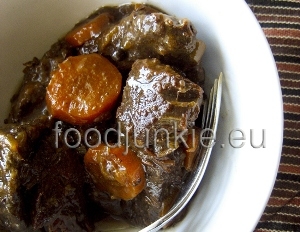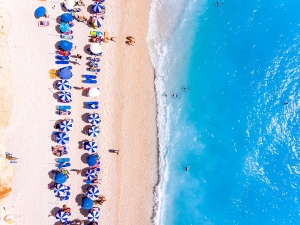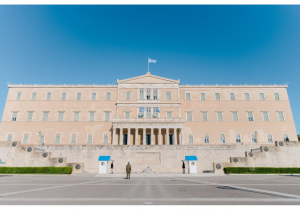Pylos Triathlon Kids & Beach Volley Tournament among this year’s activities
The award-winning sports tourism event Navarino Challenge will be held on October 16-18, 2020 presenting new sports activities and experiences for people of all ages, in Messinia, Pylos, and Costa Navarino. Loyal to its global message “sports unite people”, the event will connect people from Greece and abroad, promoting the Olympic values and “fair play”.
The Olympic sport of standing long jump is reviving in Pylos
Navarino Challenge, honoring the birthplace of Kostis Tsiklitiras, the world-famous legend and gold Olympic medalist who was born in Pylos, Messinia, will present the standing long jump activity for the first time, on Saturday, October 17. The European long jump champion, Miltos Tentoglou will be the honoree person and ambassador of this activity. The first Greek athlete to win a gold medal in this sport in European championships along with his coach George Pomaski will provide people of all ages with an opportunity to try out their jumps and attempt to surpass Tsiklitiras’ world record of 3.47m.
In the context of his participation this year, the European champion, Miltos Tentoglou stated: “I am very excited about this event. Standing long jump was one of the most beautiful competitions and it is now considered as one of the best exercises to measure precise jumping. It is also a good opportunity for people to see and experience a real race while being entertained”.
Respectively, the top track and field coach George Pomaski stated: “In such initiatives, we are always willing to participate, in order to honor and never forget the history of sports. Sports endured, stopped wars and rivalries, united continents, and fought racism. Standing long-jump is a very useful exercise for gymnastics, that we even use today because it is an important indicator of the explosiveness of a jumper. It has elements from the long jump. It is important to highlight the region through our participation, as it is the place of origin of the Olympic medalist Tsiklitiras. We must never forget such athletes and we need to preserve our history”.
Pylos Triathlon Kids: Educating young people through sports
Navarino Challenge will include for the first time in its program the highly successful Pylos Triathlon Kids organized by Pylos-Nestor Municipality, on Saturday, October 17. The event includes triathlon races with the participation of children from 4 to 18 years old. The young fans of sports will have the opportunity and the joy to run on 2 beautiful routes, to swim in the picturesque port of Pylos with the background of the historic island of Sfaktiria, in the clear blue waters of the Ionian Sea and to ride a bike in the stunning Messinian small town, in the presence of Olympic medalists and world champions. Children will be divided into four age categories: Super mini: 4-7 years old, category 1: 8-12 years old, category 2: 13-15 years old, and category 3: 16-18 years old.
In the context of the 3 rd Pylos Triathlon Kids and the revival of standing long jump, Pylos- Nestor Mayor, Mr. Panagiotis Karvelas said: “This year, Navarino Challenge is here to remind us once again about the universal ideals of Sports, organizing an even more compelling program. The revival of the standing long jump, in the presence of the prominent athlete Miltos Tentoglou and his coach George Pomaski, is an honor for us, in Pylos-Nestor Municipality, the birthplace of the first Greek Olympic medalist Kostis Tsiklitiras. At the same time, we have the pleasure to enjoy, in the context of Navarino Challenge, the successful, for many years, Pylos Triathlon Kids program, in the presence of our Olympic medalists, where our young athletes will have the opportunity to live unique experiences and values, such as those of & fair play” and “sportsmanship”.
Taking into account the global issue of youth inactivity, the top sports tourism event, exhorts young people into exercise and sports, through the Active Kids program, enriching its schedule with more children’s activities in Pylos.
Morning sea kayaking in the historic Sphacteria
Starting from Poseidonia in the port of Pylos, on Saturday, October 17, a sea kayak tour will be held on the island of Sphacteria for the second consecutive year with the support of Explore Messinia. Participants will paddle towards the inside of the Navarino Bay exploring the coastline of Sphacteria. For entries: welcome (at) exploremessinia.com
Navarino Challenge Beach Volley Tournament
Overlooking the sand dunes and crystal-clear waters of the Ionian Sea, The Dunes Beach will host the Navarino Challenge Beach Volley Tournament for the first time. The Olympic sport of beach volleyball returns with the former international Greek volleyball player and record holder of participations with the Greek National Team, Michalis Triantafyllidis, as its ambassador. On Saturday, October 17, the tournament will include separate categories for men and women, while on Sunday, October 18, the tournament will be mixed. During this weekend, the well-established beach volleyball lessons by Samsung will also be held. All beach volleyball activities are carried out with the support of Triantafyllidis Beach Arena. For registrations and more information: info(at)beacharena.gr
Tournament’s organizer Michalis Triantafyllidis stated: “This year, during the top wellness event Navarino Challenge, we provide Beach Volleyball fans with an opportunity to take part in an exemplary organized tournament, on one of the most beautiful beaches in Greece. I could not be happier”.
Accommodation Packages
Enjoy a weekend full of outdoor wellness activities for people of all ages. For more information on accommodation packages at The Westin Resort Costa Navarino, you may send your email to navarinochallenge.com or call Vita N Travel at +30 210 3249070.
40% Early Bird discount on Half Marathon registrations.
Register here!
Runners can act promptly and take advantage of the early bird offer on registrations until July 31. Athletes can register in the Half Marathon with a 40% discount and find 3 out about valid early bird offers in all other routes. Children’s race is held at no cost. The event, always prioritizing the participants themselves, offers a refund of their registration costs until August 31.
The event continues to innovate for another year by having Samsung Electronics Hellas as its Official Technology Partner. Samsung and Navarino Challenge will offer all participants the opportunity to purchase the Galaxy S20, S20+ & Galaxy Z Flip, with a 20% discount.
Discount on car rentals
The top Greek rental company Avance, as the event’s official car rental partner, provides participants of Navarino Challenge with an opportunity to make their reservation, with a 15% discount on the official price list, for any vehicle of their choice regarding their travel to Messinia during the period of the event. In terms of bookings, participants need to send an email to reserv(at)avance.gr
Navarino Challenge is held under the auspices of the Greek National Tourism Organization and is co-organized by Costa Navarino, The Westin Resort Costa Navarino, and Active Media Group with the support of Pylos-Nestor Municipality. Navarino Challenge has joined the Greek actions of the #BeactiveHellas 2020 program of the European Commission and is held under the auspices of the General Secretariat of Sports.
As every year, the event will be held, in accordance with the strict standards set by the Greek Ministry of Tourism, the General Secretariat of Sports, and the relevant sports Federations. Always having the safety and health of all participants and staff as its main priority, Navarino Challenge will be planned and delivered based on the protocol of races, which will ensure public health and safety of all parties involved.
Official technology partner: Samsung
Official sponsor: Vikos Natural Mineral Water
Official sports supplier: Luanvi
Official supporters: Pylos-Nestor Municipality, Poseidonia, Karalis Beach Hotel
Official beauty partner: Messinian Spa
Official shoe partner: On
Partner: Fysiotek Sports Lab
Official car rental partner: Avance
Premium media partner: 24MEDIA
Athletic partners: Explore Messinia, FitnessArt, Navarino Golf Academy, Navarino Outdoors, Navarino Racquet Academy, Pilates by Mandy, Red Swim Academy, Swim Academy, Triantafyllidis Beach Arena, Vizantinos target sport club
CSR Partners: Captain Vasilis and Carmen Konstantakopoulos Foundation, Karkinaki, Dogs’ Voice, Fashion Targets Breast and Prostate Cancer
Assisted by: VitaNTravel, Karalis City Hotel & Spa, Lifeguard Patrol, Pylos Association of Enterprises for Tourism Development, Maritime Athletic Pylos Association “Nestor”, Target Security, Pilia Express
Sports production: Active Media Group
Hashtags: #navarinochallenge #costanavarino #sportsunitepeople #eatwell #runwell #livewell #westincostanavarino
Photo Credit: Progame.sa











